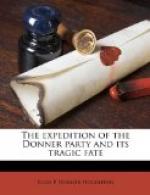The longer I wore them the more I became attached to them, and the better I understood the story he had told me; for in my musings they were not shoes, but “Spot” and “Brindle,” live Eskimo dogs, that had drawn families of queer little people in sleds over the frozen sea, and had always been hungry and ready to fight over their scanty meals. At times I imagined that they wanted to race and scamper about as happy dogs do, and I would run myself out of breath to keep them going, and always stop with Spot in the lead.
When I needed shoestrings, I was sent to the shoemaker, who only glanced up and replied, “Come to-morrow, and I’ll have a piece of leather big enough.”
The next day, he made the same answer, “Come to-morrow,” and kept pegging away as fast as he could on a boot sole. The third time I appeared before him, he looked up with the ejaculation, “Well, I’ll be damned, if she ain’t here again!”
I was well aware that he should not have used that evil word, yet was not alarmed, for I had heard grandpa and others use worse, and mean no harm, nor yet intend to be cross. So I stood quietly, and in a trice he was up, had rushed across the shop, brought back two round pieces of leather not larger than cookies, and before I knew what he was about, had turned them into good straight shoestrings. He waxed them, and handed them to me with the remark, “Tell your grandma that since you had to wait so long, I charge her only twenty-five cents for them.”
[Footnote 16: Now Jamestown.]
CHAPTER XXIV
MEXICAN METHODS OF CULTIVATION—FIRST STEAMSHIP THROUGH THE GOLDEN GATE—“THE ARGONAUTS” OR “BOYS OF ’49”—A LETTER FROM THE STATES—JOHN BAPTISTE—JAKIE LEAVES US—THE FIRST AMERICAN SCHOOL IN SONOMA.
By the first of March, 1849, carpenters had the frame of grandma’s fine new two-story house enclosed, and the floors partly laid. Neighbors were hurrying to get their fields ploughed and planted, those without farming implements following the Mexican’s crude method of ploughing the ground with wooden prongs and harrowing in the seed by dragging heavy brush over it.
They gladly turned to any tool that would complete the work by the time the roads to the mountains should be passable, and the diggings clear of snow. Their expectations might have been realized sooner, if a bluff old launch captain, with an eye to business for himself and San Francisco, had not appeared on the scene, shouting, “Ahoy” to everybody.
“I say, a steamship anchored in the Bay of San Francisco two days ago. She’s the California. Steamed out of New York Harbor with merchandise. Stopped at Panama; there took aboard three hundred and fifty waiting passengers that had cut across country—a mixture of men from all parts of the United States, who have come to carry off the gold diggings, root and branch! Others are coming in shiploads as fast as they can. Now mark my words, and mark them well: provisions is going to run mighty short, and if this valley wants any, it had better send for them pretty damn quick!”




